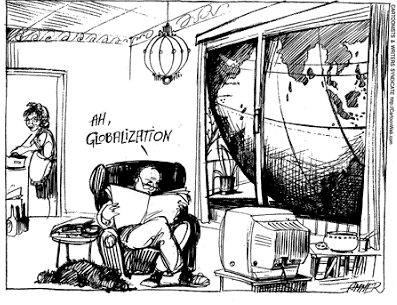By Thomas Palley (Guest blogger)The conventional wisdom is there have been two globalizations in the modern era. The first began around 1870 and ended in 1914. The second began in 1945 and is still underway. This paper challenges that view and argues there have been three globalizations, not two. The first half of the paper provides empirical evidence for the three globalizations hypothesis. The second half discusses its analytical implications. The Victorian first globalization and Keynesian era second globalization were driven by gains from trade, and those gains increased industrialized country real wages. The neoliberal third globalization has been driven by industrial reorganization motivated by distributional conflict. Trade theory does not explain the third globalization;
Topics:
Matias Vernengo considers the following as important: Economic History, Globalization, Golden Age, Keynesian Globalization
This could be interesting, too:
Angry Bear writes Has Globalization Been Reversed?
Nick Falvo writes Homelessness among racialized persons
tom writes The corruption of US foreign policy & weaponization of antisemitism
The conventional wisdom is there have been two globalizations in the modern era. The first began around 1870 and ended in 1914. The second began in 1945 and is still underway. This paper challenges that view and argues there have been three globalizations, not two. The first half of the paper provides empirical evidence for the three globalizations hypothesis. The second half discusses its analytical implications. The Victorian first globalization and Keynesian era second globalization were driven by gains from trade, and those gains increased industrialized country real wages. The neoliberal third globalization has been driven by industrial reorganization motivated by distributional conflict. Trade theory does not explain the third globalization; capital’s share has increased at the expense of labor’s; and there can be no presumption of mutually beneficial country gains from the third globalization.
Read rest here.

